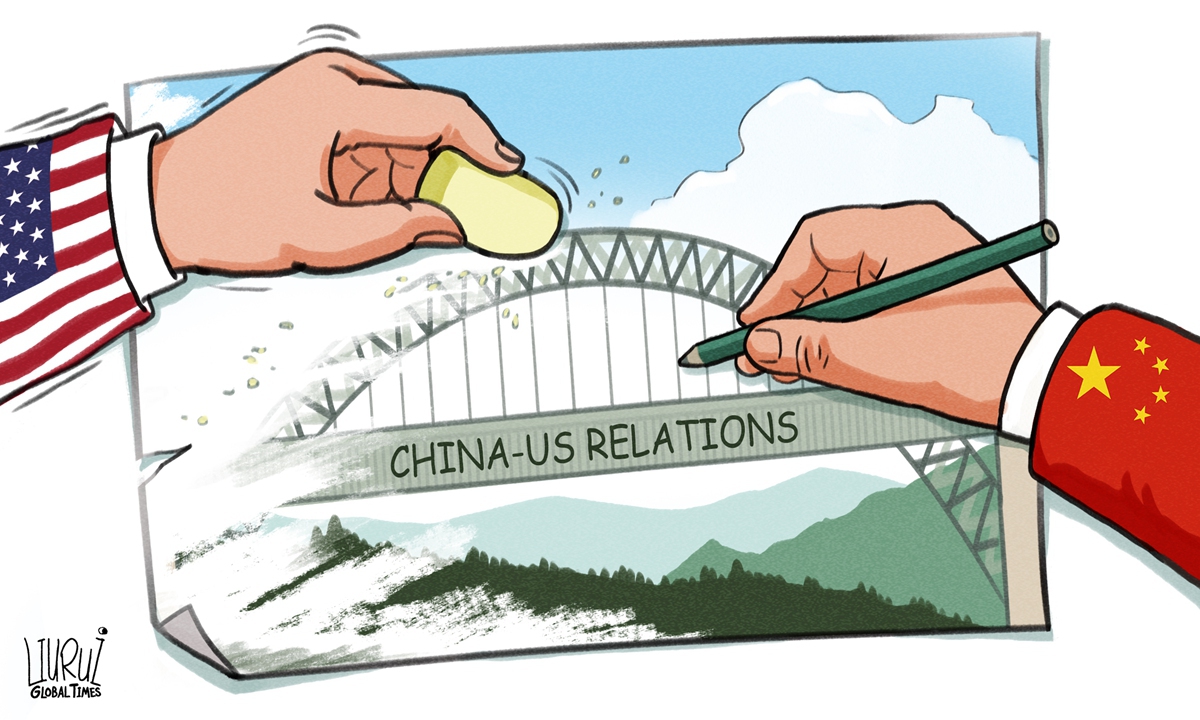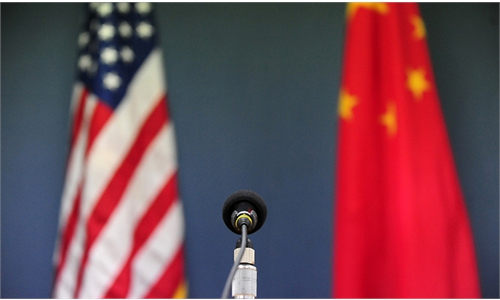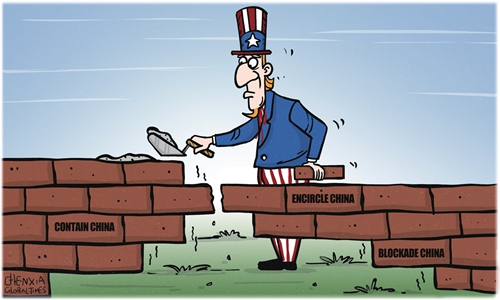US performs poorly in implementing leaders’ consensus in last four months: Global Times editorial

China-US relationship. Illustration: Liu Rui/Global Times
On Wednesday, US President Joe Biden stated to the media that he expects to speak to Chinese President Xi Jinping "within the next 10 days." Chinese Foreign Ministry spokesperson said on Thursday that "the Chinese and US presidents have maintained communication through multiple means." In regard to whether the two leaders will talk, the spokesperson said he did not have any information to offer at the moment. Recently, the US has released information about the upcoming talk between the leaders of China and the US several times, which seems to be positive.
Over the past month, high-level officials from China and the US involving fields such as strategy, foreign affairs, defense, economy and trade have held five talks. This kind of frequency, scope and depth of the exchanges have been rare since the deterioration of China-US relations, and it paves the way for future high-level exchanges between the two countries. Regrettably, in US' recent series of "confrontational" moves against China, the mentality of confrontation evidently outweighs that of cooperation, and the intention to contain China's development for a long time is clearly shown. In particular, the stark contrast between what the US has done and what President Biden has promised has gravely undermined the US national credibility.
The last phone call between the leaders of China and the US took place on March 18, and it has been more than four months since then. We made a rough count: In this period of time, there have been three visits by US lawmakers to Taiwan and one by a former defense secretary. Additionally, US House Speaker Nancy Pelosi released two trial balloons on visiting Taiwan. The US has thrice initiated arms sales to Taiwan, totaling a value of $323 million. US warships have crossed the Taiwan Straits at least three times. The US lawmakers have proposed at least six vicious Taiwan-related bills and the US State Department website once removed wording on acknowledging that Taiwan is part of China and "the United States does not support Taiwan independence." Only the latter was later restored, but the move had already triggered bad influence. The US invited the Taiwan island to participate in the so-called second Global COVID-19 Summit, vigorously promoted the island's participation in the World Health Assembly and manipulated the joint statements between US and Japan, US and South Korea and the G7 to point fingers at the situation across the Taiwan Straits.
During this period, the US also launched the Indo-Pacific Economic Framework, held a Quad summit, advanced the vote on the CHIPS Act, and proposed the so-called "Chip 4" alliance among others, all aiming at China with the purpose of containing and excluding China in economics, security, technology, foreign affairs and other areas. Despite all the packaging, it's clear that US Secretary of State Antony Blinken's May 27 speech on China policy is still essentially about using "vicious competition" to suppress and contain China's development.
Which of the above is not a violation of Biden's assurances (Biden said that the US does not seek a new Cold War with China; it does not aim to change China's system; the revitalization of its alliances is not targeted at China; the US does not support "Taiwan independence"; and it has no intention to seek a conflict with China. )? Former US Secretary of State Henry Kissinger reminded Biden on Tuesday not to engage in "endless confrontations" with China. "China-phobia" has become a demon for Washington, and US diplomacy and national strategy have revolved around it.
The fundamental way out of impasses in China-US relations is to seriously implement the consensus reached by the leaders of both countries. China has always developed the bilateral relations in accordance with the three principles of mutual respect, peaceful coexistence and win-win cooperation proposed by President Xi, and this attitude is consistent and clear. However, if the US side always acts inconsistently with its words, it's difficult not to have doubts about its sincerity in dialogue and its true intentions.
In the March 18 call, the two leaders directed their teams to promptly follow up and take concrete actions to put China-US relations back on the track of steady development. It has to be said that by observing, assessing and summarizing the bilateral relations over the past four months, it's clear that the US team has not done its job properly and should be held accountable. The US needs to give China a reasonable explanation, and most importantly, of course, to take practical actions to prove their sincerity to the Chinese side. China has previously proposed four lists and Washington needs to give a clear response on them. These are the necessary preparations for a potential call between the two leaders.
In any case, dialogue is always better than confrontation, and communication is preferable to conflict. Heads-of-state diplomacy has a strategic leading role in China-US relations and can also amplify the international community's positive expectations for future bilateral relations. The extent to which the US implements the consensus reached by two leaders will directly affect the trend of bilateral ties. In the past four months, Washington has delivered an awful performance but we hope that the US will do better next to catch up with the implementation.


